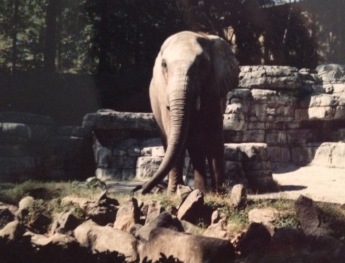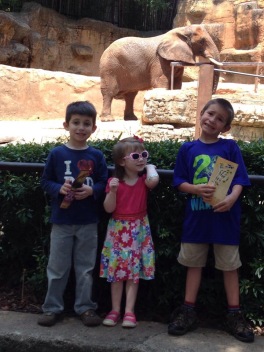
If an elephant never forgets, I wonder if, when I went back to visit her two summers ago, Joy the elephant remembered me as the little girl wearing bushy pigtails, a striped t-shirt, and scuffed Velcro sneakers? (1)Though other animal exhibits came and went, Joy served as a Greenville (SC) Zoo icon since 1977—eight years before I was born. She stood, decades on end, flapping leathery ears, dusting herself with red dirt, and blinking her long lashes at visitors as if searching for recognition.
In June of 2014, I stood with my niece and nephew in front of the familiar enclosure. “She’s packing up her trunk,” three-year-old Ava echoed my mom who had just read the sign announcing Joy’s move to the Colorado Cheyenne Zoo. Joy’s move complied with the revised Association of Zoos and Aquariums (AZA) guidelines for housing elephants, which required the zoo to have three elephants and to devote more land to their exhibit than the Greenville Zoo could provide.
“Say goodbye to Joy,” I told Ava who ignored me and ran ahead to look at the howling primates.

A few days later, June 14, 2014, Joy’s transport was somewhere between Amarillo, Texas, and Colorado Springs when her caretakers checked on her as they had done intermittently along the way. But this time, they found Joy on the floor of the trailer, dead.
Though the necropsy offered no real cause of death, online speculations abounded about negligence. I too had my questions. If the zoo hadn’t moved Joy, would she have lived longer? Had they really taken every precaution to keep her safe? But at the bottom was the question I face with each visit to a zoo: should Joy have been in captivity in the first place?
As much as I enjoy zoos, something about them makes me queasy—seeing huge birds of prey confined to a perch, polar bears panting in southern heat, and elephants swaying on concrete slabs. (According to Jeff Kinzley, elephant manager at California Oakland Zoo, leg trouble is the leading cause of death in captive elephants.)
Recently, I watched a Capuchin monkey swinging from vine to vine in a zoo cage smaller than my bedroom. After listening to my zoo concerns, Laura said, “Just think of it this way: his freedom is a small price to pay for safety from predators. He doesn’t even have to find his own food. He’s comfortable here.”
She was right—while the monkey didn’t have as much room to roam, he was well cared for. Still, for a while, I resented her rationale. Freedom is never a small price, I thought, not for people, not for primates, not for any sentient thing. No matter how comfortable or convenient captivity may be, surely it’s no substitute for unfettered freedom. Surely nothing could be better than that.
Empathy fueled my frustration for the caged creatures because I understood the feeling of comfortable captivity—I understood it well. As a teacher at a conservative Christian college, I was paid adequately, enjoyed affordable housing, appreciated generous healthcare benefits. But I also put up with the limited freedom of rigid lifestyle guidelines, a strict dress code even outside of work, and a ridiculous workload. Even with the conveniences and comfort, sometimes my position seemed like a tiny cage compared to the life I would have rather been living outside those expectations. I wanted to be free to wear blue jeans or see a movie on Friday night (things forbidden by faculty guidelines) and to spend my weekends how I liked.
Many people daily deny the chance to take to the wind
Still, I stayed for seven years because I worried who would teach my students if I left, because my department chair was relying on me to fulfill my duties, because I didn’t want to snub a stable job. I stayed out of duty because I knew that someone else was depending on my performance.
Thousands of people the world over also stay, from the single mother of three who works all hours to keep her family fed, to the caregivers of disabled loved ones, to the president of the United States who submits his freedom to the austere duties of his office. Many people daily deny the chance to take to the wind because they acknowledge that a greater cause than themselves exists—a chance to affect someone else’s life.
_______
After Joy died, I began researching her life and her death. The zoo website called Joy an “animal ambassador,” not just an exhibit but an ambassador to us. Joy was working as a representative for all other elephants on the African plains. She died a dignitary being transported from one platform to another on which to represent every endangered African elephant.
Of course humans imposed the title of ambassador on Joy. She didn’t make the choice to stay in captivity. But during her time at the zoo, who knows how many middle school reports she inspired, how many questions parents and teachers answered about her and her home in Africa. After seeing Joy, who knows how many people became aware of monstrous poaching practices or of carcasses swelling in the sun, their bones picked clean by predators and their faces hacked off by poachers greedy for profits from the ivory tusks (2).
_______
It’s been a year since I resigned from teaching at the college. For a while right after I left, I wasn’t sure how to feel: guilty, relieved, angry, afraid. Rather than the explosive freedom I imagine a dog feels when he’s broken off his chain, it left me looking back at the gates, remembering all the people who came to watch me teach them for seven years. There I sat in the wide open yonder, missing the purpose the cage gave me and the ironic freedom of others relying on me.
_______
Not all elephants live as ambassadors in zoos, of course. Most live in the wild. But it doesn’t mean they’re carefree. Caring for the herd, performing day-in-and-out rituals for survival, risking their lives to poachers—these are cages too.
_______
I’m free to do what I want now, and I’ve found purpose in new things. But there are still worries about the future, bills to be paid, school loans looming over me, frustrations in my new career.
There are dangers, duties, and destinies for us all. But I’ve come to believe that freedom, at least for humans, is determined largely upon our attitude, the purpose we discover, and the good we can do wherever we may be. There are prices to pay in both freedom and captivity.
Sometimes freedom is negotiable
Though she didn’t choose to, Joy sacrificed her freedom to teach us what, without her, we only could have learned second hand on Animal Planet and in National Geographic. In this way, her captivity was certainly not in vain.
It makes me think about my own life and the things that make me feel trapped, the responsibilities and duties that tie me down. I wonder if sometimes a measure of freedom is negotiable if it means someone else might enjoy the freedom of knowledge, direction, stability. I wonder if, through submitting myself to these restraints, I too can find purpose.
The issue of animal captivity is not simplistic, but it’s true that Joy’s life was no less purposeful because she was in a zoo (3). Through Joy’s service at the Greenville Zoo, she taught us about her species—and maybe even a little bit about ourselves.
An elephant never forgets—and neither should we.
____________________
1. Elephant memory is aphoristic for the strongest possible recall—and for good reason. aAn elephant can remember the way back to a particular watering hole year after year and can identify familiar elephants and people even after decades of separation.
2. On May 1, 2016, Ringling Brothers performed their last elephant show, ending a 146 year tradition. Who can say if the elephants were truly mistreated, and it’s hard to find a moral conclusion to the question of keeping an animal in captivity purely for entertainment purposes. But I’m thankful the elephants will receive good care in a Florida conservation center and will be able to lead lives similar to the lives they would lead in their natural habitat. Also, in other news, it’s nice to see Kenya supposedly taking measures against the horrific practice of poaching, by burning 105 million dollars worth of ivory!
3. Though I’m continually discouraged by the lack of knowledge or concern about animal rights, especially in Christendom, I was thankful to find an article and podcast in Christianity Today addressing this issue. It doesn’t necessarily give answers—but it offers a lot to think about. I can live with that.
